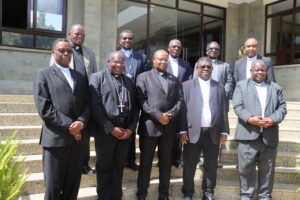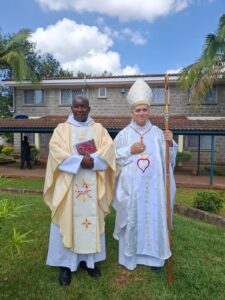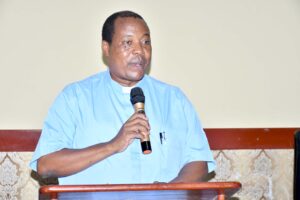UGANDA: Joint Christian Council condemns the integration of Comprehensive Sexuality Education as a curriculum
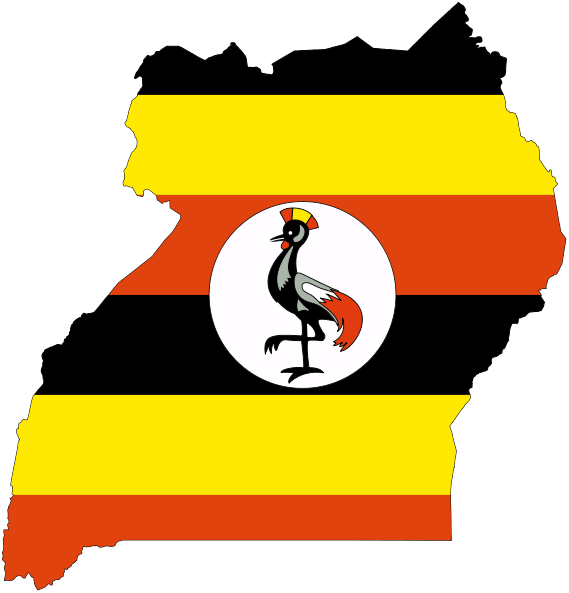
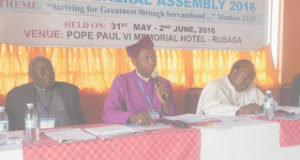
and Catholic Archbishop of Gulu, Most Rev. Stanly Ntagali,
Chairman of UJCC and Archbishop of the Church of Uganda,
and Most Rev. Cyprian Kizito Lwanga, Co-chairman of UJCC
Catholic Archbishop of Kampala during the UJCC meeting
The Uganda Joint Christian Council (UJCC) has condemned the unilateral move of introducing the so-called Comprehensive Sexuality Education in the Secondary School curriculum as it has components that undermine the teachings and core values of the church.
“UJCC Assembly noted with concern the introduction of the so-called Comprehensive Sexuality Education, which has already been introduced in some schools, including church founded schools, without due consultations with the foundation bodies and an approved curriculum,” the UJCC Executive Secretary, Rev. Fr. Silvester Arinaitwe Rwomukubwe, said adding that the assembly has directed its Secretariat to engage the government and all other stakeholders with a view of finding a lasting solution to the matter for the good of the children and the youth.
Fr. Arinaitwe was addressing the press at Jevine Hotel in Kampala during the closing ceremony of the UJCC annual meeting that was held on June 2, a day prior to the 2016 Uganda Martyrs Day celebration. The meeting was held under the theme ‘‘Striving for Greatness through Servanthood” (Mathew 23.11).
Government through the Ministry of Education and Sports/National Curriculum Development Centre (NCDC) and the United Nations Population Fund, initiated the curriculum process review in March 2012 to integrate and eventually institutionalize comprehensive sexuality education for young people both in and out of schools with a view of reducing teenage pregnancies and HIV infections.
According to the two stakeholders the curriculum development process provides a unique opportunity and entry point for addressing current and emerging issues in adolescent sexual and reproductive health and improving the health and quality of life of young people.
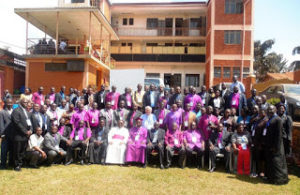
Uganda Joint Christian Council (UJCC)
The assembly was attended by the Archbishops, Bishops, Clergy women and men and lay persons who are members of the Council all drawn from the Catholic, Anglican and Orthodox Churches from the 17 regions of the country.
The Council Chairperson Most Rev. Stanley Ntagali who is the Archbishop of the Church of Uganda, together with the Co-chairperson Most Rev. Cyprian Kizito Lwanga, Catholic Archbishop of Kampala, and representatives of Kampala Metropolitan were in attendance.
Meanwhile, the religious leaders also condemned the rampant culture of irresponsible consumption of alcohol, drug abuse and gambling especially among the youth, the inhuman treatment being meted out by the security forces against opposition political leaders and their supporters and, called for sensitization of the public on the proposed Islamic banking.
“Due to these matters arising, the assembly called upon the government to tighten the laws with a view to address the unregulated production and consumption of alcohol as well as drug abuse to safeguard the family. They also tasked UJCC secretariat to engage the government to use dialogue and exercise restraint to reduce the current tension in the country as well as to spearhead the mobilization of the entire Christian community in the country to address the Islamic banking issue and engage all the stake holders including the government,” Fr. Arinaitwe explained.
The assembly further expressed concern about the minimal nature of constitutional and electoral reforms that were undertaken in the run-up to the 2016 General Elections thus, asked UJCC Secretariat to continue engaging the government, political parties and other stakeholders on the issue of comprehensive electoral reforms based on adequate consultation.
By Jacinta W. Odongo, Media Officer, Uganda Episcopal Conference
